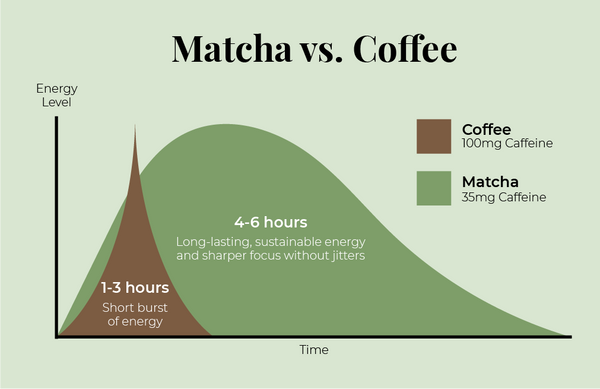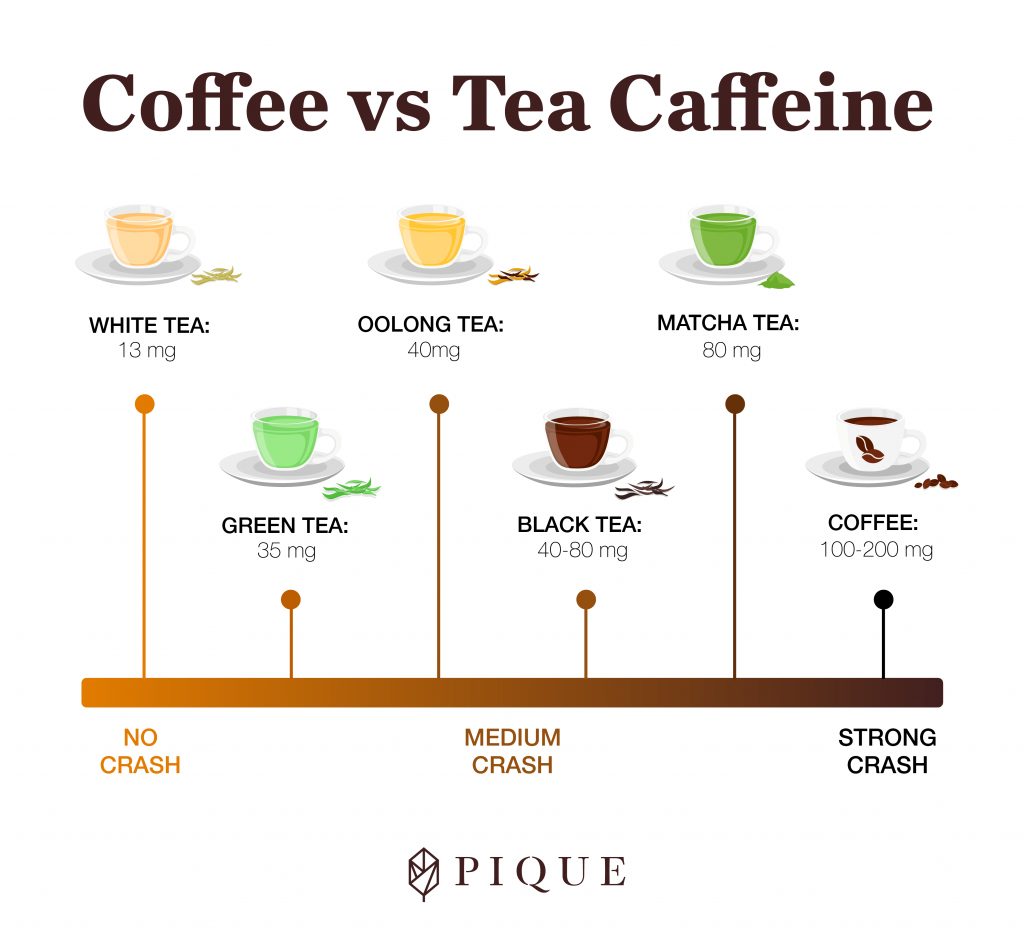How Much Caffeine in Matcha: Unveil the Energy Secret!

How Much Caffeine in Matcha? Matcha contains approximately 35mg of caffeine per 1 gram serving. Matcha, a finely ground powdered form of green tea, has gained popularity in recent years for its numerous health benefits and unique flavor profile.
One of the key factors contributing to its popularity is its caffeine content. Unlike traditional green tea, which is steeped and then discarded, matcha is consumed whole, allowing for a higher concentration of caffeine. While the exact amount of caffeine can vary depending on the brand and preparation method, on average, matcha contains approximately 35mg of caffeine per 1 gram serving.
This moderate caffeine content provides a gentle energy boost without the jitters often associated with coffee. In addition, matcha also contains L-theanine, an amino acid that promotes a calm and focused state of mind, resulting in a balanced and sustained energy throughout the day. So, whether you’re looking for a morning pick-me-up or a mid-afternoon boost, matcha can be a great choice to keep you alert and focused.
The Allure Of Matcha
The Allure of Matcha lies in the unique taste, aroma, and the numerous health benefits it offers. Matcha is a type of green tea that originated in Japan and has been consumed for centuries. In recent years, the popularity of matcha has skyrocketed, with many people incorporating it into their daily routine. In this blog post, we will explore the origins, popularity, and cultural significance of matcha, with a particular focus on its caffeine content.
Origins And Popularity
Matcha has been a staple in Japanese tea ceremonies for centuries. The tea leaves are grown in the shade, which helps to increase the chlorophyll content and give the leaves a vibrant green color. After being plucked, the leaves are steamed, dried, and ground into a fine powder. The resulting powder is then whisked with hot water to create a frothy, delicious cup of tea.
In recent years, matcha has gained popularity in the Western world due to its numerous health benefits. Matcha is high in antioxidants, which can help to reduce inflammation and protect against chronic diseases. It is also rich in L-theanine, an amino acid that promotes relaxation and reduces stress.
Cultural Significance
Matcha has a rich cultural significance in Japan and is often associated with Zen Buddhism. The tea ceremony, known as chanoyu, is an important cultural practice that involves the preparation and serving of matcha. The ceremony is a way to promote mindfulness and focus on the present moment.
In addition to its cultural significance, matcha has also become a popular ingredient in cooking and baking. Matcha powder can be used to add a unique flavor and vibrant green color to a variety of dishes, from smoothies to desserts.
When it comes to caffeine content, matcha contains approximately 35mg of caffeine per half teaspoon of powder. This is less caffeine than a cup of coffee but more than a cup of regular green tea. However, because matcha is consumed in its powdered form, the caffeine is absorbed more slowly into the bloodstream, resulting in a more sustained energy boost.
In conclusion, matcha is a unique and delicious tea that offers numerous health benefits. Its cultural significance and popularity have made it a staple in many households around the world. Whether you are looking for a caffeine boost or a way to promote relaxation and mindfulness, matcha is definitely worth a try.

Credit: naokimatcha.com
Caffeine In Matcha Vs Coffee
Caffeine in Matcha vs Coffee:
Comparative Caffeine Content
Matcha contains less caffeine than coffee but provides sustained energy due to L-theanine presence.
Differing Absorption Rates
Caffeine in matcha absorbs more slowly than in coffee, leading to gradual energy release.
The Matcha Advantage
Discover the Matcha advantage: this vibrant green tea contains roughly 35mg of caffeine per 1g serving, offering a gentle energy boost without the jitters associated with coffee. With Matcha, you can enjoy a sustained and focused state of alertness throughout the day.
Antioxidants And Nutrients
Matcha tea is renowned for its high concentration of antioxidants and nutrients. Antioxidants are compounds that help protect the body from damage caused by free radicals. Matcha contains a specific type of antioxidant called catechins, which are known for their powerful health benefits.
In fact, matcha contains significantly more antioxidants than other types of green tea. A study found that matcha has 137 times more antioxidants than regular green tea. These antioxidants help reduce inflammation, boost the immune system, and promote overall well-being.
Sustained Energy Release
Unlike coffee, matcha provides a sustained release of energy throughout the day without the jitters or crash. This is because matcha contains a unique amino acid called L-theanine, which works in synergy with caffeine to provide a calm and focused state of alertness.
While matcha does contain caffeine, it also contains L-theanine, which helps to counterbalance the stimulating effects of caffeine. This combination results in a more balanced and prolonged energy boost, without the typical side effects associated with coffee consumption.
Additionally, the caffeine in matcha is released slowly into the bloodstream, providing a gradual and sustained energy release. This can help you stay energized and focused for longer periods of time, making matcha an ideal choice for those who need to concentrate or stay productive throughout the day.
In conclusion, matcha offers several advantages over other caffeinated beverages. Its high concentration of antioxidants and nutrients contribute to overall health and well-being, while its unique combination of caffeine and L-theanine provides a sustained and focused energy boost. Incorporating matcha into your daily routine can be a beneficial choice for both your body and mind.
Measuring Matcha’s Caffeine
Discovering the caffeine content in Matcha involves precise measurement techniques. Understanding how much caffeine is in Matcha can vary based on preparation methods and serving sizes. Monitoring Matcha’s caffeine levels helps individuals make informed choices about their daily consumption.
Factors Affecting Caffeine Levels
Several factors can affect the caffeine levels in matcha, including the type of tea plant, the part of the plant used, and the processing method. The younger leaves of the tea plant tend to have higher caffeine content than older leaves. Additionally, the shading process used to grow matcha can affect caffeine levels, with longer shading periods resulting in higher caffeine content.
Average Caffeine In A Cup
The average caffeine content in a cup of matcha can vary depending on several factors, but generally, one serving of matcha contains approximately 35mg of caffeine. However, it is important to note that the caffeine content in matcha is often lower than that in coffee, with a cup of coffee containing around 95mg of caffeine.
Measuring Caffeine In Matcha
How Much Caffeine in Matcha? Measuring the exact amount of caffeine in matcha can be challenging, as caffeine levels can vary based on several factors. However, there are a few general guidelines that can help determine the caffeine content of matcha. One way to estimate the caffeine content is to look at the grade of the matcha, as higher-grade matcha tends to have lower caffeine levels.
Additionally, using a gram scale to measure the amount of matcha used can help ensure consistency in caffeine levels from cup to cup. While there is no definitive answer to how much caffeine is in matcha, understanding the factors that affect caffeine levels can help estimate the amount of caffeine in each cup. By paying attention to the type of tea plant, the part of the plant used, and the processing method, matcha lovers can enjoy their favorite drink with a better understanding of its caffeine content.
Health Implications
When it comes to the health implications of matcha’s caffeine content, it’s essential to consider both the benefits and potential risks associated with consuming this popular green tea powder. Understanding how much caffeine is in matcha and its impact on health can help individuals make informed choices about their consumption.
Benefits Of Matcha’s Caffeine
Matcha contains natural caffeine that offers several health benefits, including improved mental alertness and concentration. The caffeine in matcha is released slowly, providing a sustained energy boost without the jitters often associated with coffee consumption. Additionally, matcha is rich in antioxidants, which work in synergy with caffeine to promote overall well-being.
Potential Risks And Side Effects
While matcha’s caffeine content can provide benefits, it’s important to be mindful of potential risks and side effects. Consuming excessive amounts of matcha can lead to insomnia, restlessness, and increased heart rate. Individuals who are sensitive to caffeine should exercise caution and monitor their intake to avoid adverse effects on their sleep and overall health.

Credit: blog.piquelife.com
Matcha In Your Diet
Matcha is a popular addition to many diets, but how much caffeine does it actually contain? Discover the caffeine content in matcha and how it can fit into your daily routine. Enjoy the benefits of matcha without the jitters with this informative guide.
Incorporating Matcha Responsibly
When it comes to incorporating matcha into your diet, it’s important to do so responsibly to maximize its benefits. Matcha is a powdered form of green tea that contains caffeine, antioxidants, and other beneficial compounds. However, it’s crucial to be aware of the potential side effects of consuming too much caffeine. By following these best practices for consumption, you can enjoy matcha as part of a healthy and balanced diet.
Best Practices For Consumption
Here are some best practices to ensure responsible consumption of matcha:
- Know your limits: Matcha contains caffeine, so it’s essential to be mindful of your caffeine intake. While matcha generally has less caffeine than coffee, it still packs a punch. It’s recommended to limit your matcha consumption to 1-2 cups per day to avoid potential side effects such as jitters, increased heart rate, or difficulty sleeping.
- Choose high-quality matcha: Opt for high-quality matcha powder that is sourced from reputable sources. Look for organic and ceremonial grade matcha, as these are typically of higher quality and contain fewer impurities.
- Balance with other beverages: While matcha can be a great addition to your routine, it’s important to balance it with other hydrating beverages such as water, herbal tea, or infused water. This helps maintain overall hydration and prevents excessive caffeine intake.
- Pair with a balanced diet: Matcha is best enjoyed as part of a well-rounded diet. Incorporate it into meals or snacks that include a variety of fruits, vegetables, whole grains, and lean proteins to ensure you’re getting a balanced nutritional intake.
- Listen to your body: Pay attention to how your body reacts to matcha consumption. If you notice any adverse effects, such as digestive issues or increased anxiety, it may be a sign to reduce your intake or consult with a healthcare professional.
By incorporating matcha responsibly and following these best practices for consumption, you can enjoy the unique flavors and potential health benefits of matcha while keeping your caffeine intake in check.
Beyond The Brew
When it comes to matcha, most people think of it as a vibrant green tea packed with caffeine. But the world of matcha goes beyond just a soothing brew.
Culinary Uses Of Matcha
Matcha is not just for drinking; it can be a versatile ingredient in cooking and baking.
Innovative Matcha Products
From matcha-flavored chocolates to beauty products, the market offers a variety of innovative items beyond traditional matcha tea.
The Future Of Matcha
Experience the future of matcha with its unique blend of caffeine. Matcha contains around 35mg of caffeine per half teaspoon, providing a sustained energy boost without the jitters often associated with coffee. Its growing popularity is indicative of a shift towards healthier, natural energy sources.
Trends In Matcha Consumption
Matcha is gaining popularity as a superfood rich in antioxidants.
Research And Developments
New studies focus on health benefits and innovative applications.
Credit: www.quora.com
Frequently Asked Questions
What Is Matcha And How Much Caffeine Does It Have?
Matcha is a type of powdered green tea known for its vibrant color and health benefits. It contains about 35mg of caffeine per 1 gram, which is slightly lower than a cup of coffee.
Is The Caffeine In Matcha Different From Coffee?
Yes, the caffeine in matcha is different from coffee. Matcha contains L-theanine, which induces a calming effect, whereas coffee can cause jitters due to its higher caffeine content.
Can You Get Jitters From The Caffeine In Matcha?
Due to the presence of L-theanine, the caffeine in matcha is released slowly, providing a sustained energy boost without the jitters often associated with coffee or other caffeinated beverages.
How Does The Caffeine In Matcha Affect The Body?
The caffeine in matcha, when combined with L-theanine, promotes a state of relaxed alertness. This unique combination results in a sustained energy boost and improved focus without the crash associated with coffee.
Conclusion
Matcha contains about 35mg of caffeine per half teaspoon. It’s a moderate amount, providing a gentle energy boost without the jitters. The combination of caffeine and L-theanine in matcha promotes alertness and concentration. So, if you’re seeking a balanced caffeine source, matcha is a great choice for you.





